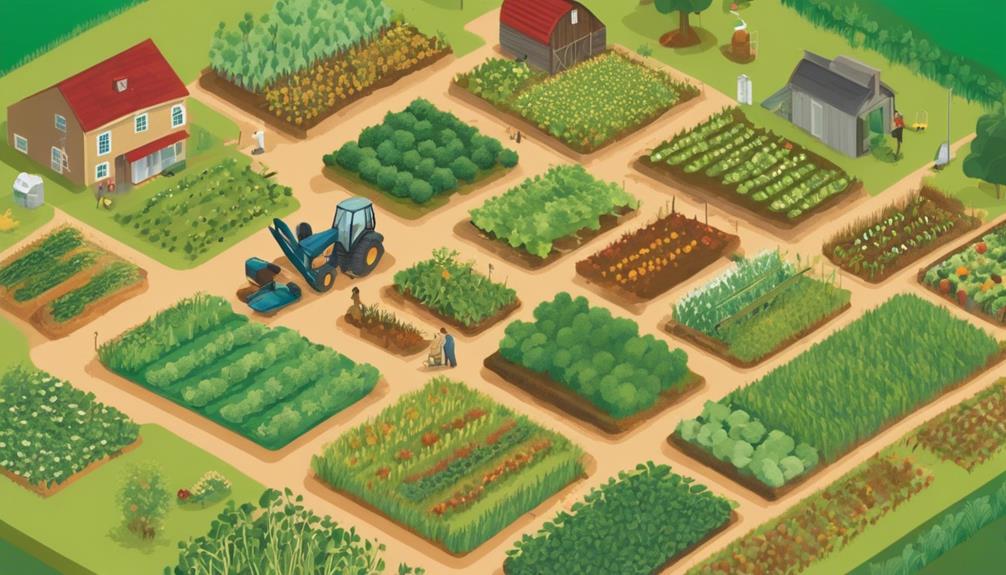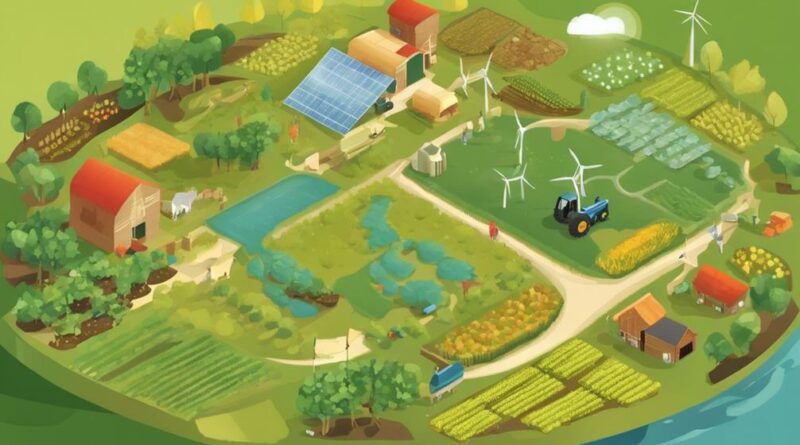Addressing Sustainability Issues in Eco-Friendly Agriculture
In eco-friendly agriculture, you tackle sustainability issues through soil health management, water conservation, biodiversity preservation, energy-efficient farming, waste reduction, climate resilience, pesticide-free methods, and community engagement. These practices enhance soil fertility, reduce greenhouse gas emissions, promote biodiversity, and empower local communities. By adopting these strategies, you can mitigate environmental impact and ensure long-term agricultural sustainability. These techniques not only benefit the environment but also foster healthier ecosystems and improve crop yields. Embracing sustainable agriculture practices leads to a more resilient farming system capable of adapting to challenges while supporting ecosystem health and productivity.
Soil Health Management
When implementing sustainability practices in eco-friendly agriculture, prioritizing soil health management is essential for maximizing crop yield and long-term environmental benefits. One crucial aspect of soil health management is understanding nutrient cycling, a process where essential nutrients are taken up by plants, returned to the soil upon decomposition, and made available for future plant growth. Effective nutrient cycling relies on microbial activity in the soil, where microorganisms break down organic matter, releasing nutrients in forms that plants can absorb. Research has shown that healthy soil with high microbial activity leads to improved nutrient availability, resulting in better crop yields.
Furthermore, nutrient cycling plays a vital role in reducing the need for external inputs like chemical fertilizers. By maintaining a balanced nutrient cycle through practices such as cover cropping, crop rotation, and organic amendments, farmers can enhance soil fertility naturally. This not only benefits the environment by minimizing chemical runoff but also promotes sustainable agricultural practices in the long run. Studies have demonstrated that incorporating these methods into soil health management can increase soil organic matter content, improve soil structure, and support diverse microbial communities, all of which are essential for sustainable agriculture.
Water Conservation Practices
How do water conservation practices contribute to the sustainability of eco-friendly agriculture? Water conservation practices play a crucial role in ensuring the long-term viability of eco-friendly agricultural systems. Two key methods that significantly contribute to water conservation are drip irrigation and rainwater harvesting.
Drip irrigation is a highly efficient water conservation technique that delivers small amounts of water directly to the base of plants. By reducing water wastage through evaporation or runoff, drip irrigation helps farmers optimize water usage while promoting plant growth. Research has shown that drip irrigation can lead to water savings of up to 50% compared to traditional irrigation methods, making it a valuable tool for sustainable agriculture.
In addition to drip irrigation, rainwater harvesting is another essential practice for water conservation in eco-friendly agriculture. By capturing and storing rainwater for later use, farmers can reduce their reliance on groundwater sources and surface water bodies. This not only helps in conserving water resources but also mitigates the risk of water scarcity during dry periods. Studies have demonstrated that rainwater harvesting can significantly increase water availability for agricultural activities, leading to improved crop yields and overall sustainability.
Biodiversity Preservation Techniques
Implementing habitat restoration programs is a key strategy in preserving biodiversity within eco-friendly agricultural systems. Habitat restoration involves creating or improving habitats to support native species and promote ecosystem balance, ultimately contributing to wildlife protection.
Here are three important techniques for biodiversity preservation:
- Promoting Native Species: Encouraging the growth of native plants and reintroducing native animal species can help restore the natural balance within ecosystems. Native species are often better adapted to local conditions, which can enhance overall biodiversity and ecosystem resilience.
- Creating Wildlife Corridors: Establishing wildlife corridors allows for the safe movement of animals between fragmented habitats. These corridors help prevent isolation of populations, increase genetic diversity, and reduce the risk of local extinctions, all crucial factors in maintaining biodiversity.
- Implementing Sustainable Land Management Practices: Adopting sustainable land management practices such as agroforestry, crop rotation, and integrated pest management can help preserve biodiversity by minimizing habitat destruction and reducing chemical inputs that may harm wildlife. These practices promote a healthier environment for both native species and agricultural productivity.
Energy-Efficient Farming Methods
To enhance sustainability and optimize resource utilization in agriculture, exploring energy-efficient farming methods is paramount. Two effective strategies in this regard are the implementation of solar powered irrigation systems and the practice of crop rotation techniques.
Solar powered irrigation systems utilize renewable energy from the sun to pump water for crops. These systems not only reduce reliance on fossil fuels but also lower operational costs in the long run. Research has shown that farms equipped with solar-powered irrigation systems have increased energy efficiency by up to 25% compared to traditional systems.
Crop rotation techniques involve alternating the types of crops grown in a particular field seasonally. This method helps improve soil fertility, reduce pests and diseases, and enhance overall crop yield. By diversifying the crops planted, farmers can also decrease the need for chemical fertilizers and pesticides, making the farming process more energy-efficient and environmentally friendly.
Waste Reduction Strategies
In waste reduction strategies for eco-friendly agriculture, optimizing resource utilization and minimizing environmental impact are key objectives. Implementing efficient waste management practices is crucial for sustainable agricultural operations.
Here are some effective waste reduction strategies to consider:
- Composting Solutions: Composting is a natural process that recycles organic materials into a rich soil amendment. By composting agricultural waste such as crop residues and manure, farmers can reduce the amount of waste sent to landfills while simultaneously creating nutrient-rich soil for their crops.
- Recycling Programs: Setting up recycling programs on farms can help minimize the amount of waste generated. Recycling materials like plastic containers, metal scraps, and paper products can significantly reduce the environmental footprint of agricultural operations.
- Food Waste Reduction: Implementing strategies to reduce food waste at every stage of the supply chain is essential for sustainable agriculture. By optimizing harvesting practices, storage methods, and distribution processes, farmers can minimize food losses and improve overall efficiency.
- Plastic Packaging Alternatives: Finding alternatives to traditional plastic packaging can significantly reduce the amount of non-biodegradable waste in agriculture. Switching to biodegradable or reusable packaging materials can help mitigate the environmental impact of plastic pollution.
Climate Change Resilience
Climate change resilience in eco-friendly agriculture requires strategic planning and adaptation to mitigate the impacts of shifting environmental conditions on crop yields and farm productivity. One key aspect of building resilience in the face of climate change is promoting crop diversity. By cultivating a variety of crops, farmers can spread their risks and increase the likelihood of having a successful harvest despite unpredictable weather patterns. Crop diversity also contributes to ecosystem resilience by enhancing soil health, reducing pest and disease pressures, and promoting biodiversity.
Resilient ecosystems play a crucial role in climate change resilience in eco-friendly agriculture. Ecosystems that are able to adapt to changing environmental conditions are better equipped to support agricultural activities sustainably. For instance, wetlands and forests can help regulate water flow and prevent soil erosion, mitigating the impact of extreme weather events on farmlands. Additionally, healthy ecosystems provide essential services such as pollination and natural pest control, reducing the reliance on external inputs.
Incorporating resilient practices into agricultural systems can help farmers navigate the challenges posed by climate change. By prioritizing crop diversity and fostering resilient ecosystems, eco-friendly agriculture can build adaptive capacity and ensure long-term sustainability in the face of a changing climate.
Pesticide and Chemical-Free Approaches

Implementing pesticide and chemical-free approaches is essential for promoting sustainable and environmentally friendly agricultural practices. By shifting towards natural alternatives and adopting integrated pest management strategies, farmers can effectively manage pests while reducing their reliance on harmful chemicals.
Here are three key points to consider:
- Natural Alternatives: Utilizing natural alternatives such as neem oil, diatomaceous earth, and beneficial insects can help control pests without the need for synthetic pesticides. These methods aren't only effective but also safer for the environment, wildlife, and human health.
- Integrated Pest Management: Integrated pest management (IPM) focuses on a combination of techniques to minimize pest damage while maintaining ecosystem balance. This approach involves monitoring pest populations, implementing cultural practices, using biological controls, and only resorting to chemical treatments as a last resort. By integrating various pest control methods, farmers can achieve long-term pest management without harming the environment.
- Reduced Chemical Residues: By reducing the use of pesticides and chemicals in agriculture, farmers can minimize chemical residues in soil, water, and food products. This not only benefits the environment but also improves the overall quality and safety of agricultural products for consumers.
Community Engagement Initiatives
Community engagement initiatives in eco-friendly agriculture play a vital role in fostering collaboration and sustainability. By establishing stakeholder partnerships, eco-friendly agriculture can leverage the knowledge and resources of various community members, including farmers, consumers, and local organizations. These partnerships facilitate the exchange of information, best practices, and innovative ideas, ultimately leading to more sustainable farming methods.
Educational campaigns are another essential component of community engagement initiatives in eco-friendly agriculture. By raising awareness about the benefits of sustainable farming practices and the potential environmental impacts of conventional agriculture, these campaigns help educate both farmers and consumers. Through workshops, seminars, and outreach programs, stakeholders can learn about organic farming techniques, water conservation methods, and soil health management.
Local empowerment is crucial for the success of eco-friendly agriculture. By involving community members in decision-making processes and encouraging grassroots involvement, agricultural practices can be tailored to meet the specific needs and challenges of local environments. This bottom-up approach ensures that sustainability initiatives are culturally sensitive and environmentally appropriate.
Conclusion
In conclusion, embracing eco-friendly agriculture practices is crucial for addressing sustainability issues in farming. By prioritizing soil health management, water conservation, biodiversity preservation, energy-efficient methods, waste reduction, climate change resilience, pesticide-free approaches, and community engagement, farmers can create a more sustainable and resilient agricultural system.
Research has shown that implementing these practices not only benefits the environment but also leads to increased productivity and profitability in the long run. It's imperative for the future of agriculture to prioritize sustainability.
